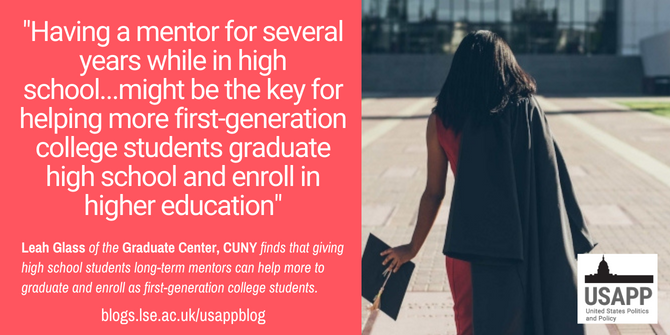 The lack of college counsellors in many schools makes it more difficult for some students to succeed and gain access to a college education, especially those who would be first-generation college students. Leah Glass looks at the effectiveness of mentorship programs, such as iMentor in New York City, finding that mentors can fill an important gap left by the lack of college counselors to ensure that disadvantaged students are able to access higher education.
The lack of college counsellors in many schools makes it more difficult for some students to succeed and gain access to a college education, especially those who would be first-generation college students. Leah Glass looks at the effectiveness of mentorship programs, such as iMentor in New York City, finding that mentors can fill an important gap left by the lack of college counselors to ensure that disadvantaged students are able to access higher education.
Why Mentors can be Important for First-Generation College Students
Accessing college can often be a complex challenge for high school students, and many have attempted to simplify the processes and barriers. Academics, school culture, teachers, and college counselors all play an important role in a student’s chances of being accepted into and enrolling in college. Navigating this minefield of new information, paperwork, and confusing institutions is made more challenging for students who are the first in their families to attend college. These students, often referred to as first-generation college students (FCGS), can be disadvantaged because they often lack the social and cultural capital that non-first-generation college students possess, who obtain it from their parents who went to college. This means FCGS miss out on vital information about the difficult and multi-step process of finding, applying to, enrolling, and succeeding in college. College counselors can play important roles to help increase college enrollment and persistence particularly by being great sources of this information. But the US Department of Education Office of Civil Rights found that one in five schools do not even have a college counselor.
To help FGCS gain these types of social and cultural capital and increase their success in applying to and enrolling in college, a myriad of programs have come into place over the past decade, both through higher education institutions as well as non-profit organizations. Most are trying, through various initiatives, to get more underrepresented students into college. Mentoring is one intervention that has shown promising results for helping low-income and first-generation college students graduate high school and enroll in college at higher rates. Mentors can help adolescents in a variety of ways, including college and career advice, personal guidance, as well as access to other adults through their network. Developing a meaningful relationship and spending time together can help the mentee reap the rewards of the human and social capital of their mentor.
Looking at a school mentoring partnership
I examined data from iMentor, a college success and mentoring organization that uses college-educated volunteer-mentors as individualized college counselors to support low-income students in New York City. This program is unique for two reasons: 1) they partner with entire schools so just about every student gets matched with a mentor and 2) they use a hybrid mentoring model so that there is a virtual and in-person component to this program. Students communicate with their mentors weekly online and meet in person once a month. Students in iMentor schools engage in a weekly online curriculum taught by iMentor staff to help build skills to navigate high school and the college admission process. The curriculum includes lessons on concepts such as developing a growth mindset to more concrete topics like filling out the Free Application for Federal Student Aid (FAFSA) form and learning about different types of universities. Importantly, in addition to monthly in-person meetings facilitated by the program, students can also meet with their mentors “out of program”, enjoying non-curricular activities like going to a museum, playing basketball together, or another recreational activity.

Photo by Jonathan Daniels on Unsplash
Three Program Elements Stand Out as Important for High School Graduation and College Enrollment
In my evaluations of the many elements of the iMentor program, there were three components that had the most impact on students’ likelihood of graduating high school and enrolling in college: the number of “out of program” meetings with a mentor, the number of lessons completed, and the length of the partnership between mentor and mentee. Students who had more out of program meetings, completed more online lessons, and were matched longer all had a higher likelihood of graduating from high school and enrolling in college.
While the number of lessons completed was not as important as meeting face to face (out of program meetings), it still showed a positive and significant relationship with graduating from high school and enrolling on time. What the combined results indicate—that is, the e-mentoring element of completing lessons (writing to one’s mentor online) and meeting out of program—is that the hybrid mentoring program can have positive benefits for mentees. The curricular, internet-facilitated elements are not as influential as the more organic in-person meetings that mentors and mentees are engaging in, but taken with the other elements of the program, do contribute to positive college-going outcomes for these students.
The results of this program evaluation have important implications, especially for first-generation college goers. While this is only an evaluation of one program, what this points to is the promising role mentors can play in a young person’s life. Having a mentor (or even several mentors) alone may not be enough; but having a mentor for several years while in high school, having the opportunity to build trust and a solid relationship outside of the formal program while maintaining the important curriculum with critical skill development might be the key for helping more first-generation college students graduate high school and enroll in higher education. If more college counselors cannot be implemented in high schools, perhaps more formal mentors can help fill that gap.
- This article is based on the paper, ‘Social Capital and First Generation College Students: Examining the Relationship Between Mentoring and College Enrollment’, in Education and Urban Society.
- Note: This article gives the views of the author, and not the position of USAPP – American Politics and Policy, nor the London School of Economics.
- Shortened URL for this post: https://bit.ly/3yPquvh
-






